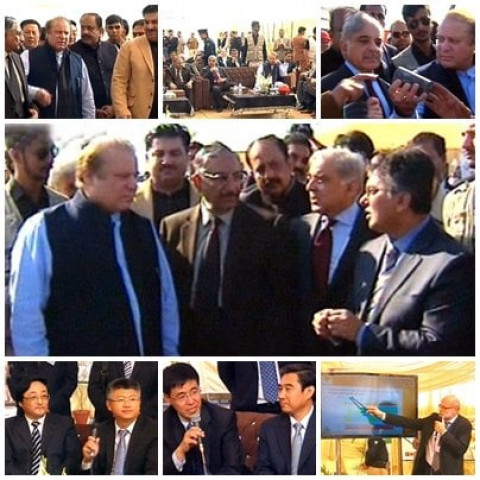PM says discovery of huge reserves of iron ore could end 'begging bowl' culture
Says discovery of iron ore as well as copper, silver and gold in Chiniot could help country's stuttering economy

Prime MInister Nawaz Sharif visits Chinio. PHOTO: RADIO PAKISTAN
The reserves were found in Chiniot city in Punjab by Chinese group the Metallurgical Cooperation of China.
A senior provincial administrative official told AFP that initial estimates indicated 500 million tonnes of iron ore -- a primary ingredient in steelmaking -- had been discovered.
He said the Chinese company has expressed interest in setting up a steel mill on the site, adding that the extracted iron had been tested in Swiss and Canadian laboratories, which found 60-65 percent of it to be high grade.
The official added that silver, copper and gold samples would also be sent for testing soon.
Speaking at the site on Wednesday, Prime Minister Nawaz Sharif said the discovery could help Pakistan's stuttering economy turn a corner and end its "begging bowl" culture.
“Instead of asking for coal from abroad, we will ask for it from Thar,” the prime minister said, while speaking at a briefing regarding the discovery of precious deposits of gold, copper and iron at Rajua in Chiniot on Wednesday. He added that the natural resources of the country will be fully exploited for the prosperity and development of Pakistan.
The prime minister said local and foreign investors will be invited to invest in projects after the completion of tests, adding that the government will fully facilitate the investors.
"It is Allah's blessing that under the lush green fields rich deposits of copper, iron and gold have been found, which will help the country get rid of the 'begging bowl' for good," PM Nawaz said.
The premier also mentioned Reko Diq in Balochistan being heavily rich in minerals, while adding that "Balochistan would benefit from this."
Nawaz said the government is facing three challenges at the moment; security, shortage of electricity and gas, and restoring peace in the country.
Conflict, instability, corruption and a chronic energy shortage have hampered Pakistan's economy for years.
The IMF granted a $6.6billion loan to Pakistan in September 2013 on the condition that it carry out extensive economic reforms, particularly in the energy and taxation sectors.



















COMMENTS
Comments are moderated and generally will be posted if they are on-topic and not abusive.
For more information, please see our Comments FAQ